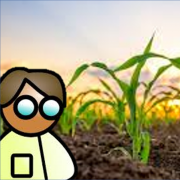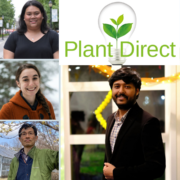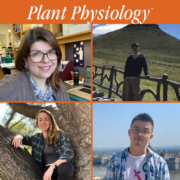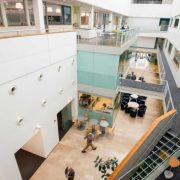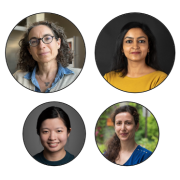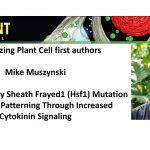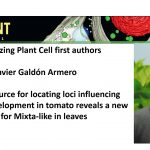Informational Interview with Wannes Voorend (R & D Coordinator at Colruyt Group)
Informational Interview by Presca Meyer, ASPB Conviron Scholar
Wannes Voorend works as a R & D Coordinator in Energy, Environment and Biotech at Colruyt Group. Colruyt Group was founded 1928 by Franz Colruyt and lists more than 30,000 employees by today. The company is managing supermarket retail stores and further subsidiaries. They are operating mainly in Belgium, but also in France and Luxembourg.
Wannes Voorend studied Biotechnology in Gent (Belgium), before he did his PhD with the topic: “Enhancing biomass production and accessibility of the cell wall for fermentation in the crop Maize and the model plant Brachypodium distachyon”. Afterwards, he stayed for 2 further years as a postdoc, working on investigating the underlying genetic mechanisms of lignin biosynthesis in maize.
Wannes Voorend’s LinkedIn profile: https://www.linkedin.com/in/wannes-voorend-a3b21015/
Wannes Voorend’s Twitter profile: @WannesVoorend
Colruyt group: https://www.colruytgroup.com/wps/portal/cg/en/home
I asked Wannes Voorend a few questions regarding his PhD, his motivation, his switch to industry and his current job.
Here are the most interesting things I learned from the interview:
- Endurance and networking are key skills that you learn during your PhD/postdoc that will help you to be successful in probably any further job but especially in industry.
- In contrast to me, Wannes Voorend had a quite clear goal since his PhD: already during his PhD he planned on working in industry later on. His main aim was to put his research into practice (and he succeeded).
- I always had the idea that if you’re working for a big company, you might get the feeling that your work doesn’t have an impact anymore. However, I was proven wrong: Wannes V. is still surprised about the huge impact his work has, even on a daily basis.
- Even if you are a plant scientist, this doesn’t mean that your future job in industry will solely focus on plants. Wannes V. started as a R & D manager of a vertical farming project, but is now a R & D Coordinator in Energy, Environment and Biotech. You always have the opportunity to grow and to learn.
- While the switch from academia to industry can be intimidating, it can also be smooth and easy.
I had some problems with my recording software, so the audio quality is not that great. You can find the interview here: https://www.dropbox.com/s/rth5…
Because of the audio quality and in case you prefer to read than to listen, I wrote down the interview questions and the core answers (or most memorable sentences) of Wannes Voorend:
The interview:
Did you already have a plan of what to do next after your PhD?
“I wanted to pursue a PhD in academics, but at the very start I knew that I wanted to apply this knowledge in industry.”
Now, you are working as a R&D manager, could you explain what you are doing on a daily basis?
“I have a small team of 10 -15 persons, that are looking for technological opportunities for Colruyt group […]. Myself and my people are looking for technologies to implement in our activities and that can be very broad.”
The projects you are working on now are not only focusing on plants..?
“Three years I worked as a project engineer/manager on vertical farming, which is of course very linked to what I’ve worked with before as a plant biotechnologist. But now I am a manager of a broader team. Parts of my team still works on vertical farming, but we also work on aqua culture techniques, water purification and so on.”
Are there other experiences from your postdoc or your PhD that helped you the most when you switched to industry?
“The perseverance to go further on with your project also when it’s not going as you wish that it goes.”
What is the biggest challenge you face in your job?
“The biggest challenge is to be aware of the new technologies, so you need a good network in the outside world. But the biggest challenge is to convert that knowledge or opportunity into application for your industry, for your own activities. That translation is the most challenging.”
Who are you depending on?
“In the end, we are depending on our core activities and our core activities are retail. We are depending on a clear vision from our managing directors. ”
Is there something you wish someone would have told you before you switched form academia to industry?
“I was always quite confident that I’d be able to apply not necessarily my knowledge, but my skills that I developed during my PhD. Perseverance is one of them, creating a network and creating a team is a very important one. Those skills are universal in industry. You can apply them anywhere you want and I think it’s just a matter of finding your own passion and energy and finding a match with companies in industry, and if that doesn’t exist you can create your own company.”
Was there something you struggled with when you started your job at the Colruyt group?
“For me it was very clear what I wanted to do and what I’ll find within Colryut.”
Did your lifestyle change when you switched from academia to industry/ did the job change had an impact on the way you live?
“The level of maturity. Working in industry had some impact: you are very aware of the surrounding network […] my world view has broaden.”
What would you tell yourself if you could meet yourself as a PhD student now (regarding you future career)?
“I was quite confidence that I will find a way to have impact and to apply my skills. On the other hand I could’ve never imagined the situation that I am in now. I’m quite confident that I am at the better end of what I could have expected.”


